
News |
- Report: Manitoba Must Adapt to Weather Extremes
- Asian Carp Travelling Toward Great Lakes
- Mt. Mealy: Canada's Next National Park Project
- UN and EU Ocean Clean Up Efforts Fail
- Scientist Disputes Lake Winnipeg Cleanup Plan
- Grizzlies Move into Polar Bear Habitat
- Another Location for Tim Horton's Camp
- Arctic Warming To Cost Billions
- Tolko Must Conduct Archaeological Studies
- Lima Declaration
- Japan Breaches Whaling Activists' Human Rights
- Quebec's New Climate Strategy Faces Opposition
| Report: Manitoba Must Adapt to Weather Extremes | 3 March 10 |
 Manitoba must expect more frequent and extreme floods, droughts and other weather events resulting from climate change states the International Institute for Sustainable Development (IISD) in a new report. Manitoba must expect more frequent and extreme floods, droughts and other weather events resulting from climate change states the International Institute for Sustainable Development (IISD) in a new report.The 77-page policy paper and literature review, The Manitoba Challenge: Linking Water and Land Management for Climate Adaptation states southern Manitoba can expect more spring flooding and summer dry spells as spring runoff occurs earlier in the year. Floods and droughts compound deterioration of Lake Winnipeg by increasing flow of nutrients into the over-fertilized body of water, the report states. The largely illegal practice of cutting new drains into agricultural land is making the new wet-spring/dry summer precipitation pattern even worse, according to the report. Early spring drainage reduces groundwater levels in southern Manitoba, rendering vast areas of farmland unprepared to deal with droughts. Hank Venema, IISD researcher, said the Manitoba government must offer more incentives to farmers to protect existing wetlands and restore old marshes. The province must move quickly to modernize its water-conservation policy and redirect existing funds to conservation programs, he adds. View January 13, 2010 IISD press releaseView IISD Report: The Manitoba Challenge: Linking Water and Land Management for Climate Adaptation (PDF) View January 14, 2010 Winnipeg Free Press article Source: Winnipeg Free Press |
|
 Print version Print version |
Top |
| Asian Carp Travelling Toward Great Lakes | 3 March 10 |
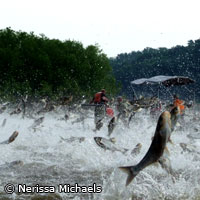 With Asian carp on the Great Lakes doorstep, President Barack Obama's administration has released a $78.5-million strategy for a study of how to avoid the species invading the Great Lakes. The US government will not shut down two navigational locks on Chicago waterways that provides easy access into the lakes for Asian carp. Instead, the plan outlines two dozen steps, from strengthening an electric barrier designed to block carp to using nets or poisons to nab fish. With Asian carp on the Great Lakes doorstep, President Barack Obama's administration has released a $78.5-million strategy for a study of how to avoid the species invading the Great Lakes. The US government will not shut down two navigational locks on Chicago waterways that provides easy access into the lakes for Asian carp. Instead, the plan outlines two dozen steps, from strengthening an electric barrier designed to block carp to using nets or poisons to nab fish."We're spending close to $80 million just for a short-term deterrent," said Joel Brammeier, president of Alliance for the Great Lakes. "We need to stop pushing money toward temporary solutions and get everyone on track toward investing in one that works for good - and that means absolute physical separation." Bighead and silver carp - both native to Asia - have been migrating toward the lakes since escaping from deep south fish ponds and sewage treatment plants in the 1970s. Carp can reach 45 kilograms and over a metre long, consuming up to 40 per cent their body weight daily in plankton, the base of the aquatic food chain. Once established in the lakes, Asian carp could starve out fish on which popular species, such as salmon and whitefish, depend. View February 11, 2010 CBC News articleView January 6, 2010 National Wildlife Federation article View January 2, 2010 New York Times article View February 21, 2010 CBC News article Source: CBC.ca Photo Source: Nerissa Michaels, Illinois River Biological Station |
|
 Print version Print version |
Top |
| Mt. Mealy: Canada's Next National Park Project | 3 March 10 |
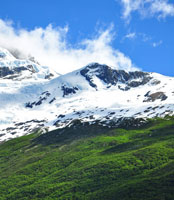 On February 5, 2010 Environment Minister Jim Prentice, with Parks Canada and Environment Minister Charlene Johnson for Newfoundland and Labrador, announced the next steps to establish a new national park reserve in the Mealy Mountains of Labrador. On February 5, 2010 Environment Minister Jim Prentice, with Parks Canada and Environment Minister Charlene Johnson for Newfoundland and Labrador, announced the next steps to establish a new national park reserve in the Mealy Mountains of Labrador.The park will be approximately 10 700 sq km, making it the largest national park in eastern Canada. The government also announced plans to establish a waterway provincial park protecting the Eagle River watershed. The provincial park will be adjacent to Mealy Mountain and will add an additional 3000 sq km of protection. The combined area will protect boreal ecosystems, wildlife and culturally areas significant to the Innu, Inuit and Métis of Newfoundland and Labrador. Boundaries for the proposed Mealy Mountains national park reserve have been unveiled, feasibility study recommendations accepted, and memoranda of understanding have been signed outlining the next steps government will take to ensure Mt. Mealy National Park Reserve establishment. View February 5, 2010 Parks Canada Press ReleaseView National Park Reserve Values for the Mealy Mountains View Parks Canada Feasibility Study Process For the Mealy Mountains View Parks Canada Traditional Land Use Analysis of the Proposed Area Source: Parks Canada |
|
 Print version Print version |
Top |
| UN and EU Ocean Clean Up Efforts Fail | 3 March 10 |
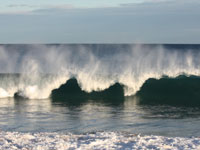 The international community has been pushing for 4 decades for government efforts to clean up the oceans. A classified German strategy report, obtained by a German news provider, states that despite efforts from the United Nations and European Union, there is no change in ocean garbage dumping and it is getting worse. The international community has been pushing for 4 decades for government efforts to clean up the oceans. A classified German strategy report, obtained by a German news provider, states that despite efforts from the United Nations and European Union, there is no change in ocean garbage dumping and it is getting worse.Since 1973 the UN has brought in protocols under the London Convention, the MARPOL provisions and the International Laws of the Seas. In 2008 the EU released a directive to guarantee good health of Europe's seas by 2020. Still, German government estimates that each year 20,000 tons of waste is dumped into the North Sea alone. The report states enforcing dumping regulations is not working, and a solution is not likely in the near future. Despite ocean dumping being illegal in many places, the oceans of the world are filled with plastic that is slow to break down. Tiny pieces of plastic are filling the oceans (18,000 plastic pieces per km2) and eaten by fish and birds. Plastic buildup in the stomachs of animals is killing them and chemicals contained in plastics can end up in the food chain, posing serious health risks. Suggested strategies to combat ocean dumping include incentives for 500 European fishing boats, recycling programs onboard ships, and use of port fees to finance garbage disposal. View February 4, 2010 Speigel Online International press releaseView UN Division for Ocean Affairs and the Law of the Sea website Sources: Speigel News International |
|
 Print version Print version |
Top |
| Scientist Disputes Lake Winnipeg Cleanup Plan | 24 February 10 |
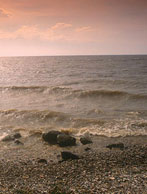 Canada's leading freshwater scientists says Manitoba is squandering millions of dollars on its plan to clean up Lake Winnipeg. David Schindler, internationally renown University of Alberta professor, said phosphorus, not nitrogen, is feeding the blue-green algae blooms that threaten one of Canada's largest lakes. Canada's leading freshwater scientists says Manitoba is squandering millions of dollars on its plan to clean up Lake Winnipeg. David Schindler, internationally renown University of Alberta professor, said phosphorus, not nitrogen, is feeding the blue-green algae blooms that threaten one of Canada's largest lakes.Manitoba previously ordered Winnipeg to cut nitrogen runoff by spending $350 million to upgrade its wastewater treatment facilities. But money spent on removing nitrogen will go to waste, Schindler told councillors at a February 23, 2010 Winnipeg City council meeting. "[The] $350,000 a year that's going to be spent would be better spent getting more of the phosphorous sources," Schindler said. Schindler added that provincial officials are basing their demands on outdated science. Terry Sargent, head of Manitoba's Clean Environment Commission (CEC), states targeting nitrogen still makes sense. The CEC has just release their report, An investigation into nutrient reduction and ammonia treatment at the City of Winnipeg's wastewater treatment facilities, which states: "We have concluded that nitrogen, while critical to all life on the planet, in excess amounts is not an environmentally benign product. This leads us to recommend to the Minister that nitrogen must be removed as part of the wastewater treatment conducted by the City." Dr. Schindler also made a submission to the CEC. View David Schindler Presentation: Will Controlling Input Of Nitrogen Benefit Lake Winnipeg? (PDF)View March 2009 CEC report (PDF) View February 23, 2010 CBC article Source: CBC |
|
 Print version Print version |
Top |
| Grizzlies Move into Polar Bear Habitat | 24 February 10 |
 A new report, Grizzly Bears in Wapusk National Park, Northeastern Manitoba, documents grizzly bears migrating into polar bear territory. Researchers found that seven grizzlies have been spotted in Wapusk National Park south of Churchill, Manitoba, between 2003 and 2008. Since then, sightings have multiplied. A new report, Grizzly Bears in Wapusk National Park, Northeastern Manitoba, documents grizzly bears migrating into polar bear territory. Researchers found that seven grizzlies have been spotted in Wapusk National Park south of Churchill, Manitoba, between 2003 and 2008. Since then, sightings have multiplied."The opportunistic sightings seem to be increasing," says co-author Linda Gormezano. "This is worrying for the polar bears because grizzly bears would likely hibernate in polar bear maternity denning habitat. They would come out of hibernation at the same time and can kill polar cubs." The grizzlies appear to be migrating south from Nunavut. Some believe that warming northern temperatures may be drawing the grizzlies into areas formerly dominated by polar bears. "It's possible we have a first warning sign of what happens when our large mammals start shifting habitat due to climate change," said Gaile Whelan Enns, director of Manitoba Wildlands. Robert F. Rockwell, research associate at American Museum of Natural History and co-author of the report said. "The Cree elders we talked to feel that now that grizzly bears have found this food source they will be staying." View report: Grizzly Bears in Wapusk National Park, Northeastern Manitoba (PDF)View February 23, 2010 Globe and Mail article View February 23, 2010 Science Daily article Source: Globe and Mail, Daily Science |
|
 Print version Print version |
Top |
| Another Location for Tim Horton's Camp | 24 February 10 |
 The Manitoba government held an open house February 16th and 17th for a Tim Horton Children's Foundation youth camp location on Whiteshell's Sylvia Lake, opposite Pinawa, Manitoba. The Manitoba government held an open house February 16th and 17th for a Tim Horton Children's Foundation youth camp location on Whiteshell's Sylvia Lake, opposite Pinawa, Manitoba.This is the second possible location for the $10-million camp. In October 2009, a proposal to build the facility at Meditation Lake was scrapped after concerns that the lake could not support the intensive development the camp would require. The new year-round camp would include facilities to host up to 260 children, and would be "environmentally friendly," according to organizers. Summer use would involve bringing Tim Horton's camp leaders in from around north America. There are some who argue this development is not environmentally sound; "This discussion again comes down to our parks, and how we want to preserve them." said Eric Reder, Campaign Director for the Wilderness Committee. "Does the Whiteshell need more forest bulldozed for development?" The Wilderness Committee is currently calling on the Manitoba government to complete a park management plan update of Whiteshell Provincial Park before allowing this or any development to proceed. View Information Boards for Tim Horton's Children's Foundation Youth Leadership Camp at Sylvia LakeView January 27, 2010 CBC article View January 27, 2010 Winnipeg Free Press article View January 27, 2010 Wilderness Committee press release (PDF) View CPAWS article Source: Winnipeg Free Press, The Wilderness Committee |
|
 Print version Print version |
Top |
| Arctic Warming To Cost Billions | 24 February 10 |
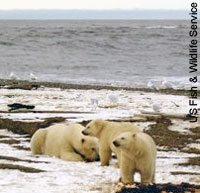 Pew Environment Group recently released a study on global warming in the Arctic that indicates it will cost the world billions of dollars. At the recent G7 conference in Iqualuit, Nunavut, Canada where finance ministers and central bank governors met to discuss global economics, Pew announced melting of sea ice and snow cover could cost the world $61- $370 billion dollars US in 2010 alone. Pew Environment Group recently released a study on global warming in the Arctic that indicates it will cost the world billions of dollars. At the recent G7 conference in Iqualuit, Nunavut, Canada where finance ministers and central bank governors met to discuss global economics, Pew announced melting of sea ice and snow cover could cost the world $61- $370 billion dollars US in 2010 alone.This is the first study that puts a dollar value on global warming in the arctic. Pew estimated the climate cooling value from the loss of snow, ice and permafrost, and converted those values and the estimated methane releases to carbon emissions equivalents. This was then multiplied by a "social cost of carbon" including cost of climate change on agriculture, energy production, water availability, sea level rise and flooding. The report estimates that in 2010 alone, arctic melting will warm the earth an amount equivalent to 40 percent of all US industrial emissions, or building 500 new coal burning power plants. The Pew Group expects that the annual costs of global warming in the arctic will rise to $2.4 trillion dollars US by 2050. View February 5, 2010 CBC articleView February 5, 2010 Pew Charitable Trusts Environmental Group press release Source: CBC News, Pew Charitable Trusts |
|
 Print version Print version |
Top |
| Tolko Must Conduct Archaeological Studies | 24 February 10 |
 The British Columbia Supreme Court has ruled the Okanagan Nation Alliance, representing seven First Nations, cannot interfere in Tolko Industries timber harvesting operations on the west side of Lake Okanagan. However, the court also ruled that Tolko logging will have restrictions and the company must first conduct archaeological studies on traditional lands. The British Columbia Supreme Court has ruled the Okanagan Nation Alliance, representing seven First Nations, cannot interfere in Tolko Industries timber harvesting operations on the west side of Lake Okanagan. However, the court also ruled that Tolko logging will have restrictions and the company must first conduct archaeological studies on traditional lands.Tolko has been granted access to harvest 8 cutblocks at Browns Creek on the west side of Okanagan Lake, as long as archaeological evidence is protected. The ONA, whose mandate is to protect Okanagan Title, rights and lands, established camps at Browns Creek to gather archaeological evidence and prevent logging on lands still used for traditional activities. The court ruling also states that Tolko must consult with ONA on archaeological assessment and ONA will participate in on-ground assessment of the land with an archaeologist. View January 19, 2010 Merritt Herald press releaseView February 4, 2010 Kelowna Daily Courier press release View February 6, 2010 Indigenous Peoples Issues and Resources press release View March 1, 2010 Digital Journal article Source: Indigenous Peoples Issues and Resources, Merritt Herald |
|
 Print version Print version |
Top |
| Lima Declaration | 18 February 10 |
 Indigenous groups from 14 countries in Latin America defended their tradition knowledge and teachings for combating climate change at the second Latin American summit on Climate Change Impacts on Indigenous Peoples held January 25-26 in Lima, Peru. Indigenous groups from 14 countries in Latin America defended their tradition knowledge and teachings for combating climate change at the second Latin American summit on Climate Change Impacts on Indigenous Peoples held January 25-26 in Lima, Peru.The summit, convened by the Coordinating Group of Indigenous Women's Continental Region South American, Central American Indigenous Council and Center for Indigenous Cultures of Peru-Chirapaq, identified best development methods on indigenous lands, measures to monitor forests and rivers, and discussed food sovereignty and security, gender and indigenous rights. Participants agreed indigenous peoples are some of the worst affected by climate change, with extreme impacts on their lands, health, culture, economy, water and natural resources. They called for unified action regarding extractive industries such as oil and mining, which directly hurt the communities. In issuing a declaration they said their traditional knowledge should be used to counter the economic models that promote dangerous, or unsustainable development. View Lima DeclarationView February 3, 2010 Latin America Press article View more information on Manitoba Wildlands Source: Latin America Press Photo Source: www.peru-explorer.com |
|
 Print version Print version |
Top |
| Japan Breaches Whaling Activists' Human Rights | 17 February 10 |
 Two Greenpeace activists arrested by Japan when they uncovered corruption in a tax-funded Japanese whaling program face trial. Illegal activities include over-harvesting of whales and whalers selling meat privately for consumption with the knowledge of government officials onboard whaling vessels. Greenpeace went public with the findings, prompting an investigation by a Tokyo district prosecutor that was shut down when the two activists were arrested for theft and trespass. Two Greenpeace activists arrested by Japan when they uncovered corruption in a tax-funded Japanese whaling program face trial. Illegal activities include over-harvesting of whales and whalers selling meat privately for consumption with the knowledge of government officials onboard whaling vessels. Greenpeace went public with the findings, prompting an investigation by a Tokyo district prosecutor that was shut down when the two activists were arrested for theft and trespass.The activists were held for 26 days, 23 without charge, questioned tied to chairs without a lawyer present and face 10 years in prison for their actions. Amnesty International filed a formal complaint about the treatment of the men, rallying support from other human rights organizations around the world. A UN Working Group on Arbitrary Detention investigating the situation informed Japanese officials: the rights to freedom of opinion and expression; to exercise legitimate activities and engage in peaceful activities without intimidation or harassment, have not been respected by Japan's justice system. The trial for the pair is set for February 15, 2010. View February 8, 2010 Greenpeace press releaseView February, 8, 2010 Huffington Post Press Release Source: Greenpeace |
|
 Print version Print version |
Top |
| Quebec's New Climate Strategy Faces Opposition | 17 February 10 |
 Quebec recently recently enacted the first regulations in Canada to adopt California's strict auto emissions standards. These regulations impose strict limits on greenhouse gas emissions from new vehicles sold in the province. Canada's Environment Minister Jim Prentice opposes the move, and believes the regulations are too strict to be practical for the province, and are 'counter productive in the North America market place.' Quebec recently recently enacted the first regulations in Canada to adopt California's strict auto emissions standards. These regulations impose strict limits on greenhouse gas emissions from new vehicles sold in the province. Canada's Environment Minister Jim Prentice opposes the move, and believes the regulations are too strict to be practical for the province, and are 'counter productive in the North America market place.'The new standards require new light vehicles to produce no more than 127 grams of carbon dioxide by 2016, a decrease of 35%. Auto manufacturers will face a fine of $5000 for every vehicle sold that doesn't meet the new standards, beginning with 2010 models. There is concern Quebec's targets will force consumers to go out of province to buy vehicles due to price increases for vehicles that meet the new Quebec standards. Despite opposition to Quebec's regulations, fifteen US states (40% of the US market) have agreed to meet the same standards. There are also federal plans in Canada for regulations to harmonize Canadian and U.S standards to meet California standards by 2016. View February 1, 2010 Globe and Mail press releaseView February 3, 2010 Global News press release Sources: Canwest News Service, Globe and Mail |
|
 Print version Print version |
Top |


 RSS Feeds:
RSS Feeds: